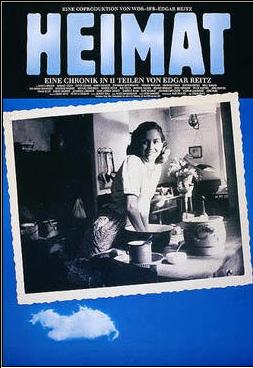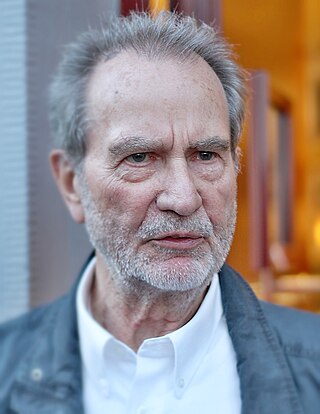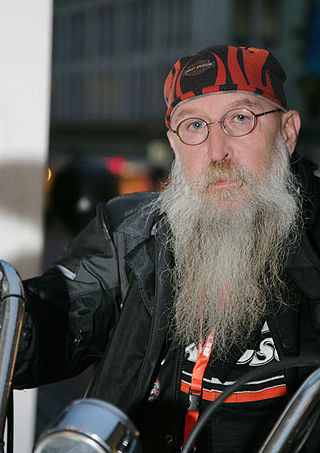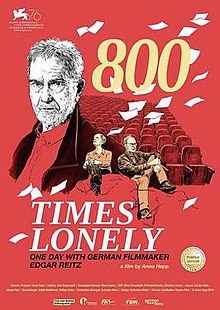
Alexander Kluge is a German author, philosopher, academic and film director.

Heimat is a series of films written and directed by Edgar Reitz about life in Germany from the 1840s to 2000 through the eyes of a family from the Hunsrück area of the Rhineland-Palatinate. The family's personal and domestic life is set against the backdrop of wider social and political events. The combined length of the 5 films — broken into 32 episodes — is 59 hours and 32 minutes, making it one of the longest series of feature-length films in cinema history.

Edgar Reitz is a German filmmaker and Professor of Film at the Staatliche Hochschule für Gestaltung in Karlsruhe. He is best-known for his internationally acclaimed Heimat film series (1984-2013).
Paul Rudolf Parsifal "Percy" Adlon was a German director, screenwriter, and producer. He is associated with the New German Cinema movement, and is known for his strong female characters and positive portrayals of lesbian relationships. He is best known for his 1987 film Bagdad Cafe, starring Marianne Sägebrecht, CCH Pounder and Jack Palance and subsequent films such as Rosalie Goes Shopping (1989), Salmonberries (1991) and Younger and Younger (1993). Adlon's films were shown in competition regularly at international film festivals, such as the Cannes Film Festival, the Berlin International Film Festival, and others.

The Golden Lion is the highest prize given to a film at the Venice Film Festival. The prize was introduced in 1949 by the organizing committee and is now regarded as one of the film industry's most prestigious and distinguished prizes. In 1970, a second Golden Lion was introduced; this is an honorary award for people who have made an important contribution to cinema.
Heimatfilme were films of a genre popular in Germany, Switzerland, and Austria from the late 1940s to the early 1960s. Heimat can be translated as "home", "hometown" or "homeland".

The 6th annual Venice International Film Festival was held between 8 and 31 August 1938. The festival screened a French cinema retrospective, spanning works from 1891 to 1933.

Soul Kitchen is a 2009 German comedy film directed by Fatih Akın, with a screenplay by Akın and Adam Bousdoukos, based on Bousdoukos' story on his own experiences as the owner of a Greek tavern named "Taverna", where Akın was a regular customer.

Germany in Autumn is a 1978 West German anthology film about the period of 1977 known as the German Autumn, which was dominated by incidents of terrorism. The film is composed of contributions from different filmmakers, including Rainer Werner Fassbinder, Alexander Kluge, Edgar Reitz, Bernhard Sinkel, Alf Brustellin, Hans Peter Cloos, Katja Rupé, Peter Schubert and Volker Schlöndorff. It was entered into the 28th Berlin International Film Festival, where it won a Special Recognition award.
The 49th annual Venice International Film Festival was held on 1 to 12 September 1992.
Marita Breuer is a German actress, known for her portrayal of Maria Simon born Wiegand in the Heimat series.
Lichtburg has been a popular name for cinemas in Germany. Those in Berlin, Essen and Düsseldorf have been particularly famous; the Lichtburg in Oberhausen is the site of the International Short Film Festival Oberhausen, and Quernheim is the smallest municipality in Germany with a cinema, also called Lichtburg.
The 41st annual Venice International Film Festival was held from 1 to 11 September 1984 under the direction of Gian Luigi Rondi.

Roland Reber was a German director, author and producer.

Home from Home is a 2013 German drama film directed by Edgar Reitz. It was screened out of competition at the 70th Venice International Film Festival. It is shot in black and white, but there are some colour sequences. It is a prequel to the Heimat film series and concerns the Simon family living in the fictional Hunsrück village of Schabbach from 1840–1844.
The 30th annual Venice International Film Festival was held from 23 August to 5 September 1969. There was no jury because from 1969 to 1979 the festival was not competitive.
The 29th annual Venice International Film Festival was held from 25 August to 7 September 1968.
The 28th annual Venice International Film Festival was held from 26 August to 8 September 1967.

Anna Hepp is a German filmmaker, artist and photographer.

King Otto is a 2021 feature film directed by Christopher André Marks. The film tells the story of the victory of the Greece National Football Team at the 2004 European Championships.










